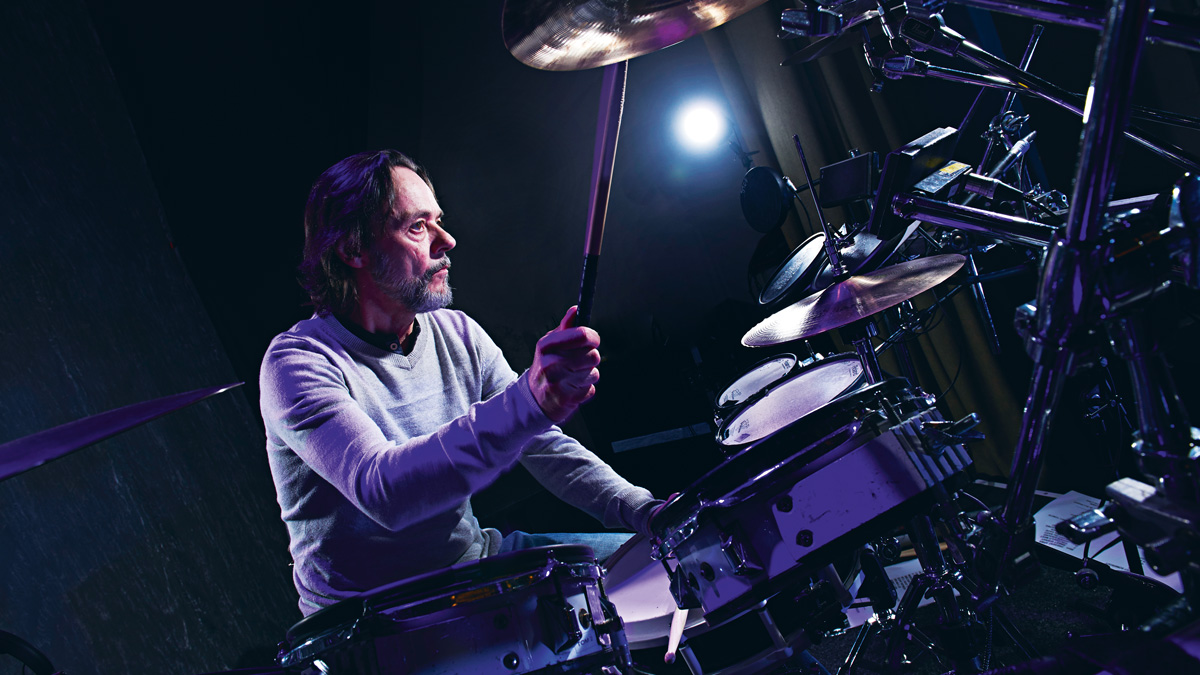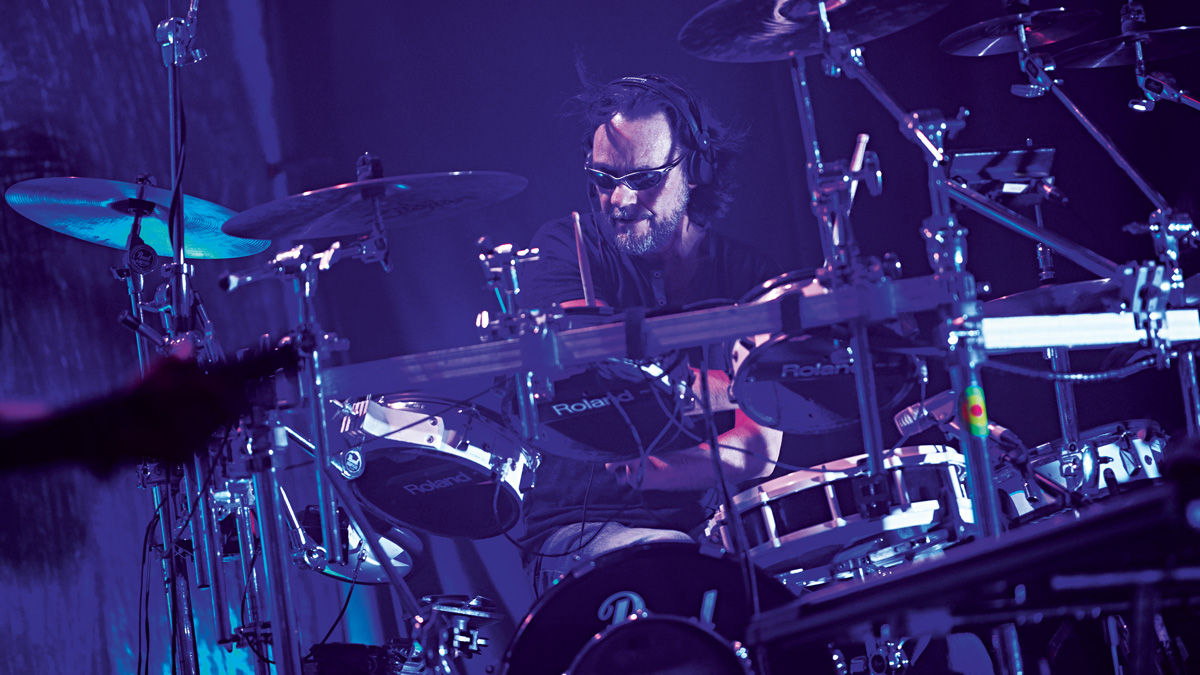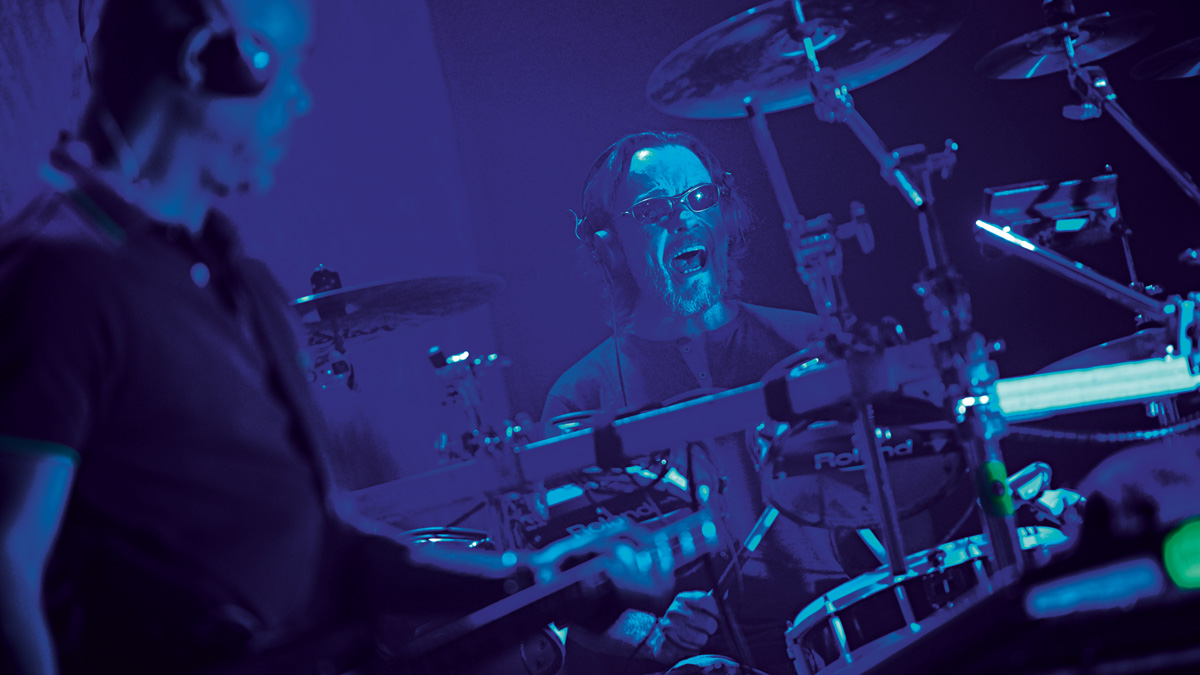UB40's Jimmy Brown: "It’s not easy to play reggae. It’s not easy to do it right."
Drummer looks back on 40 years of UB40

Birmingham beginnings
With over 70 million records sold worldwide, UB40 are one of the most successful bands that Britain has ever produced.
But while many of the mega bands of the ‘70s and ‘80s were very typically British – whether it be through the pomp of prog or punk’s railing against the establishment – drummer Jimmy Brown and his UB40 band mates were taking cues that, despite being right on their doorstep, were originally from much further afield.
“We were living in inner city Birmingham surrounded by people from the Caribbean, India and Pakistan,” Jimmy explains. “We went to school with the first generation of British-born kids from the Caribbean. We were exposed to reggae.”
The reggae pop of this bunch of Midlands school friends quickly caught on, with the band hitting the Top 5 with each of their first five albums.
I was known as the one that was always tapping.
Today, despite some line-up changes (there are currently two versions of the band on the road) UB40 remain a solid draw. When we speak to Jimmy the band is wrapping up another successful year of touring and are looking ahead to doing it all again in 2017. To start with though we want to return to Jimmy’s early drumming and reggae roots…
How did you get started with drumming?
“I just started tapping out rhythms on the desk at school. There were a few of us that used to do that. It was something I did that annoyed the teachers and my mum. I was known as the one that was always tapping. I must have had some kind of affinity to drumming from early on.”
You grew up in a part of the country that was full of different cultures, did that have a big impact on your early musical influences?
“At the time prog rock was big and that wasn’t for us, that wasn’t where we lived. The simplicity and rawness of reggae was attractive for us compared to the pomposity of prog.
"Dub had started at that point as well and that was important, that was a little bit rebellious. We were hooked by it. We were a multi-cultural group of friends and we all got into it.
"We were making a rod for our own back though because it’s not easy to play reggae. It’s not easy to do it right. It doesn’t matter how talented the drummer is there’s no guarantee they can do it. It’s a unique style.”
None of us could read or write music, we hadn’t even touched an instrument when we formed a band.
So, you were never going to be a prog band?
“No. It was like what happened with punk, it was a reaction to the classically trained prog musicians. Reggae fitted into that. None of us could read or write music, we hadn’t even touched an instrument when we formed a band.
"It was accessible, reggae doesn’t go out of its way to use too many bridges, it’s stripped-down and simple. The rawness needed to come back into music. We were never punks, of course, but we were part of the first wave of skinheads and the mods, that’s the environment we came out of.”
Is reggae all about feel?
“You need to understand it. Just listening to it doesn’t mean you will understand it. It’s the most disciplined style in the world. The thing I learned about reggae early on is once you have the idea to do something, don’t.
"Look at Eric Clapton’s version of I Shot The Sheriff. They’re the greatest musicians you can imagine but from a reggae point of view it’s not right. Even Stevie Wonder doing the Bob Marley tribute, it’s not really right even though he’s one of the greatest musicians in the world.”

The big breakthrough
Did you put UB40 together while you were at school?
“We tried to put something together when I was 14 or something. Someone got hold of a drum kit and I tried to play but I just bashed at it. I had no idea about kick, snare and hats at that age. We left school and two or three years we came back together as a gang and focused on the music.”
Once you reconvened it wasn’t long before you recorded the first UB40 album, was it?
“It wasn’t long. We were all creative, we had all gone to art school. If you can write something you can probably paint or you can probably play music. We didn’t have a clue what we were doing, though. I don’t think we were even tuned up right.
"That didn’t stop us though. It was all on instinct, we were picking apart the records that we loved and trying to reproduce what we loved. I wasn’t disciplined enough in the early days. Some of what I played was superfluous. When I record now I will go in the studio three or four times and usually the last thing I do is take stuff out.
"You only need one thing to punctuate the music so if there is a brass part I might take a drum fill out.”
That first album, Signing Off, was recorded in a makeshift studio…
“It was recorded in somebody’s bedroom. It was a guy called Bob Lamb’s bedroom. We had this little eight-track and a desk and we would wake him up in the morning, wait for the heater to warm up the room and we’d record. We didn’t know how to record but we managed it on that eight-track.”
Labour of Love came a few years later and was a huge hit. Where did the idea of putting an album of covers come from?
“Signing Off had a couple of covers and at the very end just as the record arm came to the middle we put a loop of Ali singing a track called Version Girl and we did that on Labour Of Love.
"We thought these tunes like Red, Red Wine were internationally massive, because in our little square block they were the top tunes. When we got out of Birmingham we realised that these tunes hadn’t been heard by anybody.
"It was brilliant, there were endless songs we could over that people didn’t know. People thought Red Red Wine was our song, whereas it is a cover version of a cover version.
"Signing Off was a success, it was in the charts for 96 weeks. Four years after that we had Labour Of Love and that relaunched our career.”
Has there been a big change in your playing from those days to now?
“Definitely, I do a lot less now. I was a bit fidgety in the early days. I don’t always want to showboat. We went through the phase of using a lot of machines during the dance explosion.
"In recent years though I have gone back to doing live takes. I wasn’t really good enough to do that years ago. As you get older you have the right feel and the touch.
"As you get older it becomes easier to just play the f***ing thing rather than spending hours trying to simulate it on a computer.”
We thought these tunes like Red, Red Wine were internationally massive...When we got out of Birmingham we realised that these tunes hadn’t been heard by anybody. It was brilliant, there were endless songs we could over that people didn’t know.
How about your kit, has that gone through many changes?
“God, it’s changed loads. My unique style comes from adding a lot of electronics. I have basic kick, snare, hats, toms and cymbals but then I have eight different trigger pads scattered around the kit.
"What I do is I trigger one bar or two bars, sometimes even eight bars, sounds and samples. For example, the last album has steel guitar on it so I trigger that while I’m playing the basic beats. Our bassist sings a few songs live as well so when he does that I trigger the bass.
"Sometimes I’ll trigger something that is 16 bars long and it will have a count in it and I will follow it along. It really is effective and it gives us a polished sound.
It gives us a record quality sound live, but we don’t want to use backing tracks, we’re still performing live. It’s a bit like spinning plates and I really enjoy that.”
Were you an early adopter of electronics?
“I fully embraced drum machines early on. I remember getting a 101, not an 808, that’s how early we were it was a 101. I’m not a snob about electronics, if it sounds good then do it. There’s some really s*** music made by musicians and some great music made by computers.”

Electro pioneer
You mentioned earlier that you often end up taking parts out of your drum takes. Do you slave over drum tracks in the studio?
“The minute you decide a record is done you can always find something different you wish you had done. That always haunts me. I always want an extra day to take something out or put something in.
"You can go on making a record for the rest of your life. It’s always a disappointment to me when the recording process stops. I always look forward to the next one.”
What has been the biggest challenge of your career?
“Performing live was a bit challenge early on. I felt terrified for the first five or six years. We got big quick so we were playing festivals to 100,000 people and we had hardly come out of the rehearsal room.
"I feel sorry for young bands in that respect. Some bands never get to the point where they enjoy live performance. They play by the skin of their teeth until their career is over. For us, now the stage is our home.”
We get booked when someone wants to have a great time. We can go there and 20,000 people will turn out and sing along to our songs. Having that success is something I could never dream of.
The UB40 catalogue is full of songs with fairly slow bpms, many drummers struggle to consistently play slowly
“One of the reasons reggae is difficult is that many of the beats are slower than your heart rate. In that way it is kind of anti-intuitive. I found that Whiplash movie annoying.
"It was all about faster, quicker, higher but from my experience playing slower is harder and that gets overlooked, especially now people are used to listening to music made with computers. You can’t go back to sloppy ‘70s recordings.
"The music has to be tight like a machine.”
"It’s not easy to have a groove that is 70bpm but is tight enough to make you want to dance. Most pop music might be 100pm, dance music goes up to 160bpm.
"That’s why people find it hard to dance to reggae because they get stuck in not knowing whether to half-time or double-time and they get stuck somewhere in between.
UB40 has undergone some line-up changes. Has that had an impact on the live chemistry?
“We’ve always been mates, when we started out we didn’t even know what instruments we were going to play. That chemistry as mates has always stayed with us.
"There are different levels of ability because we were mates and not musos, and we have had some line-up changes but there are six of us who are the foundation of the band and who went to school together and five of those six are still with the band.
"People sometimes think they have chemistry when they haven’t, but when we look back we had chemistry. When we get together we only sound like UB40, it’s a signature sound and most bands dream of developing their own signature sound.
"It’s such a pleasure now that we don’t even think about it, we just enjoy it.”
It’s not easy to play reggae. It’s not easy to do it right. It doesn’t matter how talented the drummer is there’s no guarantee they can do it. It’s a unique style.
You’re almost 40 years in now and still touring. What is the key to that longevity?
“We’ve done 120 gigs promoting our last album. We’ve sold 250,000 tickets. When our singer left we went into a bit of a nosedive but we got ourselves out of it and things are speeding up. We’re off to Holland next and then India and then Germany, Australia, New Zealand, America, we never stop.
"It’s like an old boy’s club when we’re on tour, we might as well get out the dominoes and the cards. We like the little world that we’re in. Our whole lives have been spent travelling and playing.
"It’s like the medieval days where we turn up at the village, they feed you and you entertain them. It’s an incredible life and music has allowed me to have a big family and a nice life without worrying.
"I shouldn’t go on like that because it’ll sound like I’m up my own arse! I still pinch myself at how lucky we’ve been and everything we’ve done. We get booked when someone wants to have a great time.
"We can go there and 20,000 people will turn out and sing along to our songs. Having that success is something I could never dream of.”
And how about the secret to sustaining such a long career as a drummer?
“Musicians improve with age. We get better with repetition. I have burnt those neural pathways into my brain of the material that we do. We’re chasing perfection.
"Maybe I have some obsessive compulsive aspect of my personality in that I find it easy to concentrate on mindless tasks. Reggae is not something where you play drum solos, it’s all about the groove and making that groove perfect. With reggae you don’t do much but what you do has to be perfect.”
Rich is a teacher, one time Rhythm staff writer and experienced freelance journalist who has interviewed countless revered musicians, engineers, producers and stars for the our world-leading music making portfolio, including such titles as Rhythm, Total Guitar, Guitarist, Guitar World, and MusicRadar. His victims include such luminaries as Ice T, Mark Guilani and Jamie Oliver (the drumming one).
